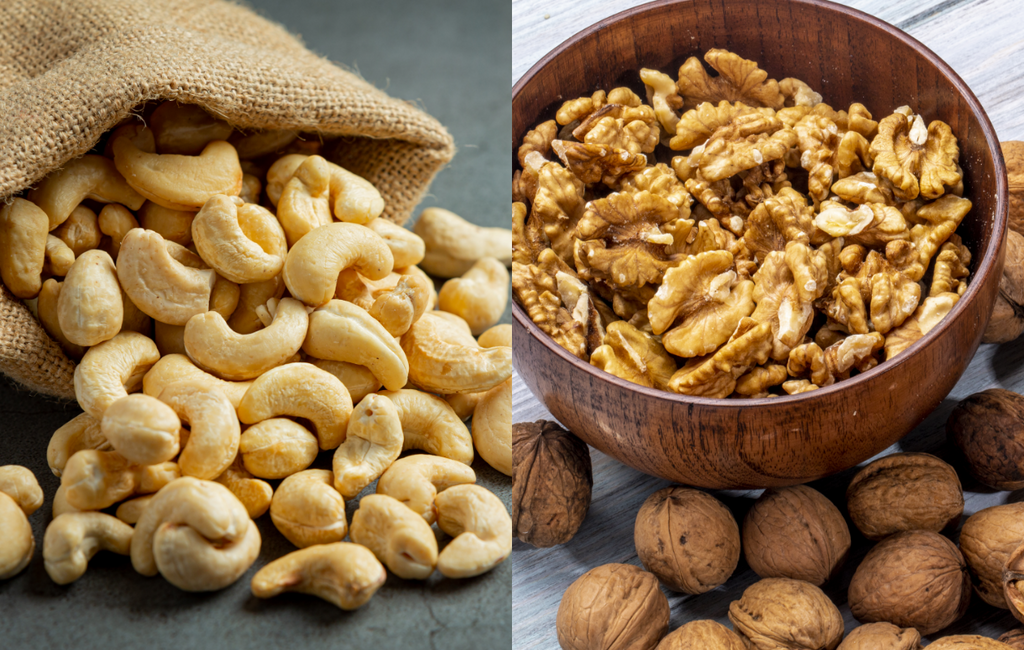# Type at least 1 character to search # Hit enter to search or ESC to close
Cashews or Walnuts, Which is healthier?
Search
-
-
The Role of Food ...
Aug 07, 2025 -
Is Cashew Good Fo...
Jul 29, 2025
Archive
- September 2025
- July 2025
- June 2025
- May 2025

Cashews or Walnuts, Which is healthier?
Nuts have long been hailed for their health benefits and versatility in the culinary world. Among the nutty contenders, cashews and walnuts have emerged as favorites for their distinct flavors and textures.
But when it comes to choosing between the two, do cashews steal the show? Let’s compare the two!
Creamy Cashews
We love cashews for their rich and buttery taste. They offer a creamy indulgence with a delicate crunch. Whether enjoyed on their own, roasted or incorporated into various dishes, cashews bring a delightful texture and a distinct nuttiness that makes them a favorite among nut enthusiasts.
Earthy Walnuts
Walnuts possess a robust and earthy flavor. With their unique shape resembling little brains, walnuts are packed with omega-3 fatty acids, antioxidants, and fiber. They have a slightly bittersweet note and a satisfying crunch. Walnuts add depth to salads, baked goods, and savory dishes, providing a distinct nuttiness that complements a wide range of culinary creations.
Versatility of Cashews
When it comes to versatility, cashews shine. Their naturally smooth texture allows them to be transformed into luxurious cashew-based sauces, dips, and even dairy-free cheeses. Moreover, cashew cream is a beloved vegan alternative that adds a luscious touch to soups, desserts, and creamy pasta dishes.
The ability of cashews to mimic dairy makes them a go-to choice for those seeking plant-based alternatives in their recipes.
Omega-3 Rich Walnuts
While both nuts offer nutritional benefits, walnuts have a distinct advantage in terms of omega-3 fatty acids. They are one of the few plant sources that provide a significant amount of this essential nutrient.
Omega-3 fatty acids are known for their heart-healthy properties, supporting brain function and reducing inflammation. Including walnuts in your diet can be a great way to boost your omega-3 intake.
The Nutritional Profile of Cashews
When it comes to overall nutrient profiles, cashews offer a wealth of goodness. They are a good source of healthy fats, protein, fiber, vitamins and minerals. These nuts are particularly rich in copper, magnesium and phosphorus, which play vital roles in maintaining bone health, nerve function, and energy production. Additionally, they contain beneficial antioxidants like vitamin E and plant compounds with potential health benefits.
Culinary Versatility of Cashews
In the realm of culinary versatility, cashews steal the spotlight. Their neutral flavor profile allows them to be used in both savory and sweet dishes. From creamy sauces and dressings to decadent cashew-based desserts, the possibilities are endless. Cashews lend themselves well to flavor infusions, making them ideal for exploring a range of culinary creations.
In conclusion, while both cashews and walnuts bring their own unique qualities to the nutty table, cashews often take the lead in terms of creaminess, versatility, and culinary exploration. However, walnuts should not be overlooked for their omega-3 content and robust flavor. The choice between the two ultimately depends on personal preference, dietary needs, and the desired culinary outcome.
So, whether you're a cashew lover or a walnut enthusiast, embrace the nutty goodness and incorporate these delightful gems into your meals and snacks.
© 2022 WWCashews. All Rights Reserved | 1-888-404-0472 | info@wwcashews.com





Leave a comment